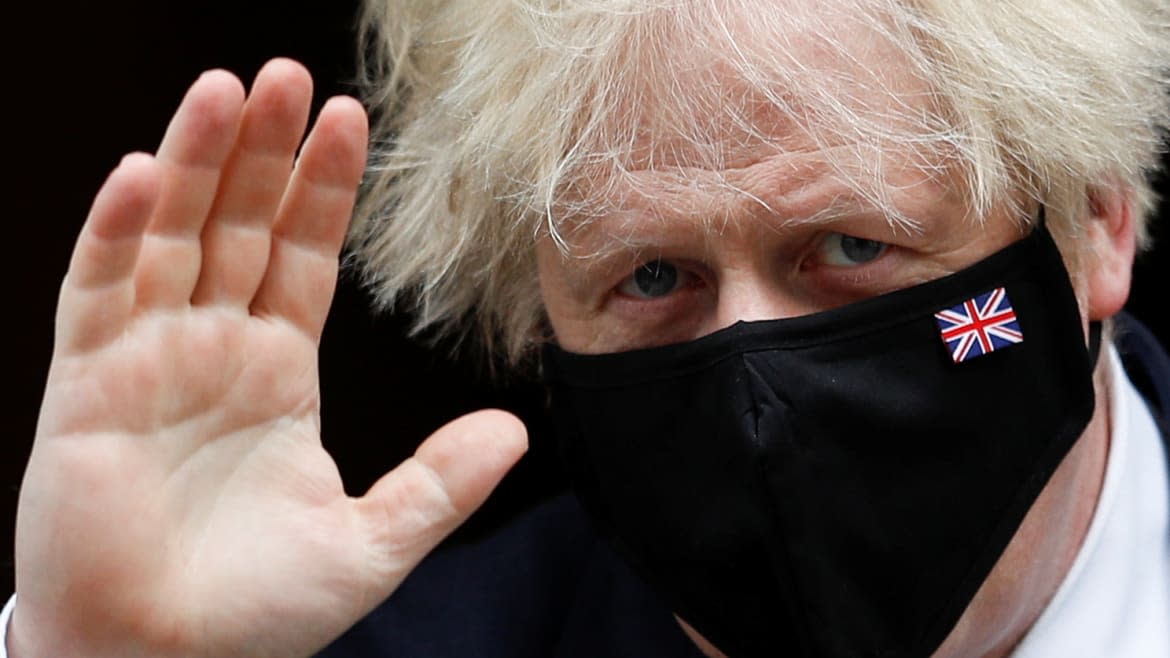Over 600,000 Brits Ordered to Self-Isolate Last Week in Delta-Fueled ‘Pingdemic’

- Oops!Something went wrong.Please try again later.
If you stick your head out of a window in England right now, the chances are you’ll hear a notification alert followed by a bellowed expletive.
A staggering 618,903 people in England and Wales—that’s around one in every hundred people—were told to isolate last week after coming into suspected contact with someone who has tested positive for COVID-19. The alerts, sent out by the U.K. government’s bluetooth-powered contact tracing app, advise users not to leave their homes for 10 days.
Over the past two weeks, as the alerts lit up phone screens across the land, the U.K. media bemoaned the phenomenon as a “pingdemic.”
Thursday’s SUN: “Pings Are Running Out” #TomorrowsPapersToday pic.twitter.com/dvHHJmDYJc
— Allie Hodgkins-Brown (@AllieHBNews) July 21, 2021
The new record-breaking total of pings all went out between July 8 and 15, in the days just before Prime Minister Boris Johnson lifted nearly all legal pandemic restrictions this week. Britain has been suffering from a huge new wave of infections this summer driven by the Delta variant, the Euro soccer championship, and Johnson’s hasty reopening.
In what now seems like an inevitable ironic twist, Johnson was pinged ahead of this week’s lifting of restrictions and had to deliver his statement marking what he had branded “Freedom Day” in isolation.
Now, so many people are either sick or isolating that it’s causing serious staff shortages—particularly in service industries and food supply lines— and social media feeds have been filled with photos of empty grocery shelves. Supermarkets have begged customers not to panic buy and the government has expressed fears over imminent shortages.
“I don’t want people to get the impression that every shelf in every supermarket is bare. That is not the case, but we are certainly concerned about instances of shortages, we are looking at the supply chains of critical industries, and we are reviewing that situation,” Business Secretary Kwasi Kwarteng said Thursday when asked about the empty shelves.
England Ditches Masks and Packs Out Nightclubs on Boris-Branded ‘Freedom Day’
The scale of the alerts has been so vast that it appears to be causing a potentially disastrous public backlash against the app itself.
In England and Wales, the vast majority of pandemic contact tracing is carried out by the app. Anyone can voluntarily download it to their phone, and, if a user returns a positive COVID-19 test, the app is then able to alert any other users who came close to that infected person in the days leading up to their positive test. They are asked to isolate for 10 days from the initial exposure, but the alert is not legally enforceable.
As an opt-in scheme, it relies on public compliance—and it seems that’s being tested by relentless pings and negative press coverage.
The hashtag #DeleteTheApp has been trending on social media for days, radio phone-ins have carried dubious tales of people being pinged after sitting too close to a neighbor on the other side of a shared wall, and a poll showed that one in 10 people who had previously used the app had gotten rid of it. Young people were much more likely to have hit delete.
The ex-health secretary, Jeremy Hunt, warned the government it risks losing “social consent” for the app unless it decreases its sensitivity or makes fully vaccinated people exempt from isolation rules. He said that, if the public loses patience with the app, then it will become much more difficult to track future clusters as the nation fully reopens.
In England and Wales, the rules around isolation are set to change from Aug. 16, when fully vaccinated people and under-18s will not have to stay at home if they’re exposed to someone with a positive virus test.
But, until then, and with there being almost no legal pandemic restrictions left in force, it appears England’s “pingdemic” will go on.
Got a tip? Send it to The Daily Beast here
Get our top stories in your inbox every day. Sign up now!
Daily Beast Membership: Beast Inside goes deeper on the stories that matter to you. Learn more.

